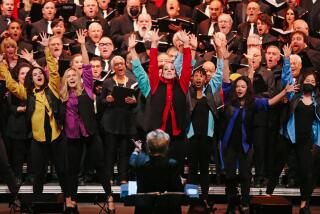French Choir Accentus Makes a Somber Debut
- Share via
Introductions can be difficult. If Laurence Equilbey and her brilliantly accomplishedFrench choir, Accentus, had a self-definition for us in their somber, arduous North American debut Thursday at Schoenberg Hall, it seemed to be: We are serious, hear us reflect.
There may have been other messages as well, but UCLA omitted all texts and notes from the printed program, leaving us to translate the choral French, Latin and German on the fly. Not that there were any problems with the ensemble’s diction, but this was a tough assignment and immediately discouraging, since first up was “Granum Sinapis,” Pascal Dusapin’s fragmented setting of a text by the medieval German mystic Master Eckhart.
In this unfortunate context, Dusapin’s meditative but hardly drab suite of eight short movements was reduced to an abstract exercise in sonority. This is a largely motionless music, but one with a sense of vocal space and dimension, and an extreme singing challenge almost miraculously met.
The Dusapin is from Accentus’ latest recording, and the 9-year-old choir has also recorded quite successfully the choral works of Poulenc that formed the center of the program. Equilbey was a rather mannered podium presence, reminiscent of Herbert von Karajan in his most enervated and affected form, but her singers produced well energized and focused sound perfectly suited to the contours of Poulenc’s four penitential motets.
In some ways, Poulenc’s secular cantatas “Un soir de neige” and “Figure humaine” are as suppliant as the motets, but considerably more virtuosic, dramatic, edgy and fatally crippled by lack of textual comprehension. Granted, Paul Eluard’s surrealist poetry is not easy to translate, but even just the French would have helped support the marvelously pointed singing.
To conclude, there was the sonic and spiritual warmth of Schoenberg’s “Friede auf Erden,” rich but also a bit fussy. In encore there was a striking arrangement of Ravel’s “Soupir,” with whistling replacing the original woodwinds, and Debussy’s “Dieu!”
More to Read
The biggest entertainment stories
Get our big stories about Hollywood, film, television, music, arts, culture and more right in your inbox as soon as they publish.
You may occasionally receive promotional content from the Los Angeles Times.










